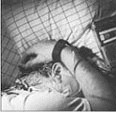



|
|
 |
Dennis Meredith |
Q. How did you know you wanted to be a science writer?
A. I knew I liked science a lot, but I didn't want to do labratory science or a specific area of science. I also liked to write a lot.
Q. How long did you have to go to school?
A. I got an undergraduate degree in chemistry and I did graduate work in biochemistry for my masters degree. A lot of people start with only bachelors degrees, though, and start as underwriters low down and work their way up. Some people also do it through a degree in Journalism or English. They have to learn more science, but as long as you like science and are willing to learn you can do it.
Q. What is your favorite part of being a science writer?
A. Talking to scientists and being able to pass on the information in a vivid way. You have a lot of scientific adventures as a science writer.
Q. What is your least favorite part of being a science writer?
A. When you write, you never get to just do science writing. The stuff that isn't science writing isn't any fun, like going to meetings and things.
Q. Do science writers just write for magazines and journals, or do they write books for children and textbooks?
A. There are science writers and scientific writers. Science writers write for the public, they write in magazines, and books for children. Scientific writers write for other scientists, in research reports, or scientific journals. They also write technical manuals. Some science writers work for universities, like me, and they write about the things that go on in the university. Or some work for newspapers. Some are freelance writers, and they get assignments from editors. If a freelancer has something he especially wants to write about, he has to go to an editor and "pitch" the idea to the editor. If the editor likes the idea, he assigns the freelancer an article about that topic.
Q. What is your favorite thing that you've written, or written about?
A. It always seems to be the last thing you've written. I enjoy writing about new discoveries in astronomy or medicine.
Q What kind of person do you think makes the best science writer?
A. Someone inquisitive, and a generalist who can see the whole picture. Someone who likes concepts and explaning concepts.